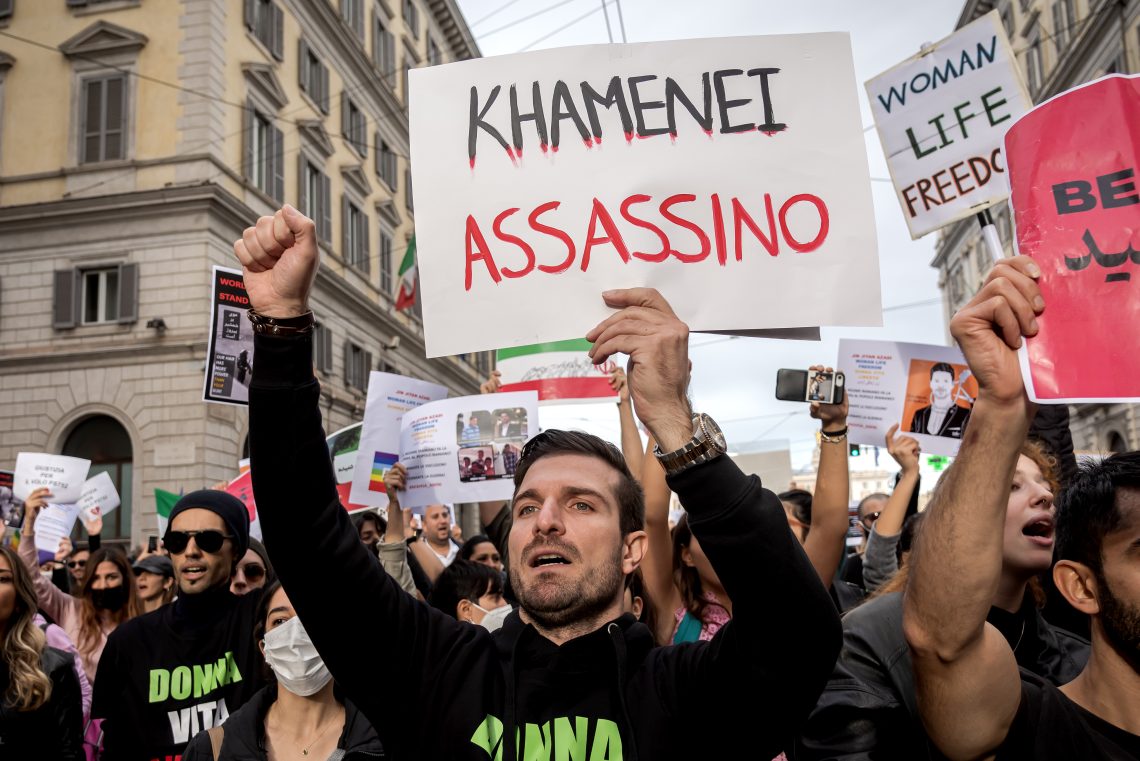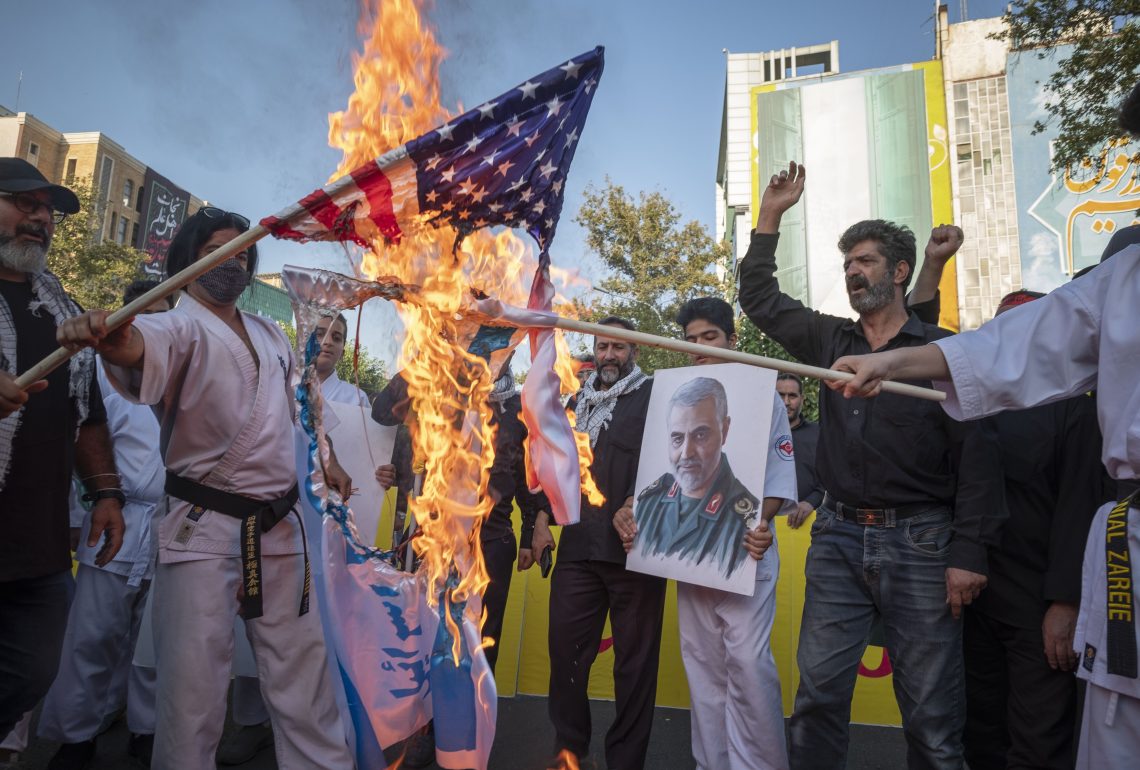Confronting a nuclear-armed Iran
As Tehran inches closer to developing nuclear weapons, the quarreling United States and Israel are forced to review their options for a joint response.

In a nutshell
- Iran’s march toward nuclear weapons is part of an aggressive foreign policy
- Politically, the Biden administration cannot let the regime go nuclear
- Strains in U.S.-Israel relations are complicating joint action against Tehran
Iran likely already has the means to become a nuclear-armed state and the capability to “produce nuclear weapons on demand,” according to nuclear expert David Albright, president of the nonprofit Institute for Science and International Security in Washington, D.C.
The leaders of Israel and the United States have repeatedly said such a development is unacceptable. But it remains unclear what the two allies can or will do to stop Tehran.
Strained partnership
One complicating factor is the state of the U.S.-Israeli relationship. While ex-President Donald Trump demonstrated support for the hard-right government of Israeli Prime Minister Benjamin Netanyahu, President Joe Biden has taken a frostier stance.
Even before Mr. Netanyahu returned as prime minister in December 2022, President Biden shifted U.S. policy closer to what it was under President Barack Obama, in office from 2009 to 2017, with support for the Palestinians and a “two-state solution” to the conflict. For instance, Mr. Biden restored U.S. contributions to the United Nations Relief and Works Agency for Palestine Refugees in the Near East (UNRWA), a significant source of foreign aid.
While the fundamental relationship is as strong as ever, political strains are considerable. Trust and confidence are low as each side criticizes the other freely. The U.S. government, for instance, has found fault with some Israeli policies, such as Mr. Netanyahu’s controversial judicial reform proposal and summoned the Israeli ambassador to the U.S. to protest an Israeli law repealing the 2005 disengagement from the northern occupied West Bank.
More by James Jay Carafano
Near-term scenarios for the U.S.-Iran competition
U.S. policy adrift in the Middle East
Differences over the Iran agreement
A complicating factor in the strained relationship has been the Biden administration’s effort to restore the moribund Joint Comprehensive Plan of Action (JCPOA), also known as the Iran Deal (first agreed to in 2013), from which the U.S. withdrew under Mr. Trump. The Israeli prime minister has consistently held that the Iran Deal assists rather than diminishes prospects for Iran becoming a nuclear breakout state.
In contrast, the Biden administration has prioritized the Iran Deal over relations with Israel, energy security, counterterrorism and the Abraham Accords, which have had a promising start promoting the normalization of ties between Arab states and Israel.
The U.S. position is understandable given the significant number of former Obama officials in the Biden administration, including ex-Secretary of State John Kerry and present Deputy Secretary of State Wendy Sherman, Mr. Obama’s chief negotiator for the Iran Deal.
Iran has frustrated U.S. efforts by showing no willingness to return to the deal, regardless of the American concessions. Instead, Iran has sought to deepen relations with China and Russia to offset international sanctions and isolation. Iran has zero faith that Congress would support a new Iran Deal.
Nevertheless, the U.S. continues to leave loopholes in sanction enforcement as a gesture of goodwill, actions that drew a severe rebuke from U.S. Senator Ted Cruz. The Texas Republican recently berated U.S. Secretary of State Antony Blinken in a congressional hearing for delivering military aid to Ukraine while allowing Tehran to rebuild its energy exports, restore its economy and sell weapons to the Russian Federation.

Security tensions in the region
Despite the JPCOA talks and internal protests against the regime’s domestic oppression, the Iranian government has retained an aggressive foreign policy. While Tehran recently accepted an agreement to restore ties with Saudi Arabia, it continues to support the Houthis in a proxy war in Yemen. There are reports that Iran may be attempting to supply the Houthis with missiles that can reach Israel. Further, Iran enables violence against Israel by Hezbollah in Lebanon and the Palestinian Islamic Jihad.
Most recently, Iran has been actively interfering with commercial shipping in the Strait of Hormuz. The response has led to renewed Israeli-U.S. cooperation, including plans for deploying additional U.S. naval forces to the region. Recently, the commander of U.S. Central Command (CENTCOM), responsible for overseeing military operations in the area, was in Israel for joint talks.
Joint U.S.-Israel naval operations in the Red Sea are routine. It is, however, unusual for either side to advertise them. The degree to which these activities are now publicly revealed may signal to the Iranians and their proxies that Israel and the U.S. are on the same page. Yet current actions seem more like an exercise in deterrence rather than preparation for a joint offensive.
Despite political tensions, both the U.S. and Israel seem intent on maintaining the threat of military operations as a conventional deterrent.
Scenarios
Little is publicly known about a U.S.-Israel response to an Iran nuclear breakout. The U.S. administration is likely to keep the door open to the Iran Deal, despite the unlikelihood of its revival. Instead, the U.S. will rely on the implicit threat of conventional strikes against the regime to support the Israelis.
The reason to assume this is the current policy is Russia’s war on Ukraine. Iran’s support for Russia makes Western nations more willing to accept preemptive attacks on Tehran. Further, despite the recent agreement between Iran and Saudi Arabia, trust in Iran’s regime remains low.
The U.S. response to Russian threats to employ nuclear weapons in Ukraine was likely a warning that America would conduct a massive and devastating conventional attack on Russia’s invading forces. Moreover, China will probably drop its support of the Kremlin in the event of a nuclear attack. The potentially devasting consequences are not lost on Iran.
Going into a national election in 2024, President Biden could not afford the embarrassment of being the American leader who let Iran go nuclear. If Republicans retake the White House, U.S. policy is unclear.








